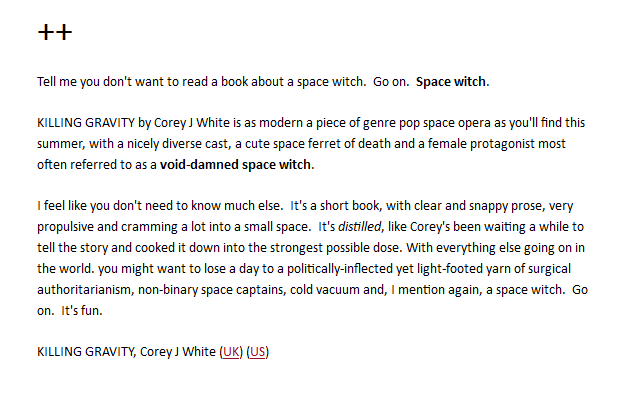Two exciting things have happened recently, one of which I’d been meaning to post about for a while.
First, I signed with literary agent Martha Millard at Sterling Lord Literistic, based in NYC. Martha reached out to me after reading Killing Gravity, was super enthusiastic, and had some great advice for me in regards to turning this little book of mine into an actual writing career. Martha’s been in the business for a long time, and represents some big names in science fiction, like William Gibson and Ian McDonald. If you’d told teenage-me with his nose buried in Neuromancer that I’d one day share an agent with Gibson, I would not have believed you.
The second thing is that Warren Ellis was kind enough to find time in his consistently-crazy work schedule to write up a couple of paragraphs about Killing Gravity in his Orbital Operations newsletter.
 I’ve been a fan of Warren Ellis’ comics, prose, and newsletters for a long time now, so this means the world to me. (And if you think ‘being a fan’ of a newsletter is a bit weird, you’ve obviously never subscribed to one of Warren’s. You’ll get everything from political, sociopolitical, and technological commentary, to recipes, to ‘reviews’ of books and films, music recommendations, the occasional blistering rant, and gems of writing advice. I’d say his insights into the writing process are invaluable for any writer, but particularly for anyone with aspirations to write in the comics field.)
I’ve been a fan of Warren Ellis’ comics, prose, and newsletters for a long time now, so this means the world to me. (And if you think ‘being a fan’ of a newsletter is a bit weird, you’ve obviously never subscribed to one of Warren’s. You’ll get everything from political, sociopolitical, and technological commentary, to recipes, to ‘reviews’ of books and films, music recommendations, the occasional blistering rant, and gems of writing advice. I’d say his insights into the writing process are invaluable for any writer, but particularly for anyone with aspirations to write in the comics field.)
Now, if you’ve somehow discovered my work before Warren’s, then let me make some recommendations. As far as prose goes, Normal is fantastic. It’s a 2016 novella put out by FSG, and it’s Warren at his abyss-gazingly best: hints of William Gibson’s Blue Ant trilogy and Jeff Vandermeer’s Southern Reach trilogy (to me at least), with characters that could only have emerged from Ellis’ mind, and a sort of technological paranoia/perversion that seems a perfect response to the surveillance capialism of today.
For a look at the sort of ‘thinking out loud’ you get in Warren’s newsletters, you can’t go past Do Anything, which I could try and describe, but would probably fail – so instead, click here.
And in the comics realm, there is so much to choose from. Some personal favourites though:
- Black Summer – a superhero decides the President of the United States is a war criminal beyond redemption who needs to be killed. But that’s not the arc of the comic, that’s the opening few pages. Was written as a response to George W. Bush deceiving the Western world into a fucked up war in Iraq, but will probably still appeal to people today who like the idea of POTUS being slain.
- Desolation Jones – Ellis’ take on the classic ‘noir detective in LA’ genre, but where the detective is a former British spy who lost all fear and human empathy after being subjected to a particularly fucked up experiment, and who is on the trail of Hitler’s personal porn stash.
- Global Frequency – a fantastic series of connected sci-fi one-offs. A TV pilot was filmed, and it’s criminal that it was never picked up – it had the potential to be something akin to Person of Interest meets Fringe.
- Trees & Injection are two newer series, that have a couple of volumes each so far and are shaping up to be some of the best SF comics of the 2010s.
- And if you’re more of a superhero person, Ellis’ runs on Stormwatch, Authority, and Planetary are some of the best super stuff you’re going to find.
So yeah, exciting times. But that’s enough for now. I’ve got a book to write and another book to edit. Take care of yourself, and those closest to you.